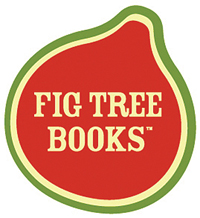Bedford, New York–based fiction publisher Fig Tree Books (figtreebooks.net) enters the literary scene this spring with its first two titles—rereleases of Alan Cheuse’s 1986 novel The Grandmothers’ Club, now titled Prayers for the Living, in March, and playwright Meyer Levin’s 1956 novel Compulsion in April. Established in 2013 by entrepreneur Fredric Price, Fig Tree is committed to publishing “high quality, commercially viable novels that chronicle and enlighten the unique American Jewish experience.” The press seeks not only to publish new work by emerging and established authors, bu t also to republish older and out-of-print titles by authors who wrote “at a time when Jews were less well-integrated into American society.” Taking its name from a 1790 letter from George Washington to the Hebrew Congregation of Newport, Rhode Island, expressing the hope that “every one shall sit in safety under his own vine and fig tree,” the press aims to create a space for Jewish voices through both its books and its website, which features a blog with posts from staff and guest writers; book reviews; and a recommended reading list focused on the American Jewish experience. The press’s other upcoming titles include Jonathan Papernick’s debut novel, The Book of Stone, and Jessamyn Hope’s debut novel, Safekeeping, which will be published in May and June, respectively. Price says, “Publishing the best fiction of the American Jewish experience isn’t just a tagline. It is our mission statement, and we are not going to deviate from it. So it might mean publishing only up to a dozen novels a year. I’m fine with that, as I am obsessed with quality, not quantity.” Price and his editorial team are currently focused on novels but hope to eventually expand their list to novellas, novels-in-stories, and memoirs. In the meantime, novel submissions are open year-round via Submittable.
t also to republish older and out-of-print titles by authors who wrote “at a time when Jews were less well-integrated into American society.” Taking its name from a 1790 letter from George Washington to the Hebrew Congregation of Newport, Rhode Island, expressing the hope that “every one shall sit in safety under his own vine and fig tree,” the press aims to create a space for Jewish voices through both its books and its website, which features a blog with posts from staff and guest writers; book reviews; and a recommended reading list focused on the American Jewish experience. The press’s other upcoming titles include Jonathan Papernick’s debut novel, The Book of Stone, and Jessamyn Hope’s debut novel, Safekeeping, which will be published in May and June, respectively. Price says, “Publishing the best fiction of the American Jewish experience isn’t just a tagline. It is our mission statement, and we are not going to deviate from it. So it might mean publishing only up to a dozen novels a year. I’m fine with that, as I am obsessed with quality, not quantity.” Price and his editorial team are currently focused on novels but hope to eventually expand their list to novellas, novels-in-stories, and memoirs. In the meantime, novel submissions are open year-round via Submittable.

Please log in to continue.
LOG IN
Don’t yet have an account?
Register for a free account.
For access to premium content, become a P&W member today.







